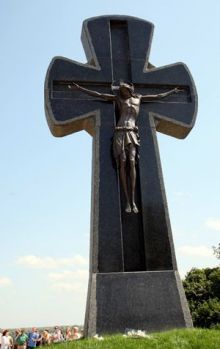An unheard-of rain was falling in Baturyn on November 13. Maybe, that was the way the nature was mourning over thousands who perished, as they were defending in an unequal fight not only themselves and their houses, but without exaggeration, Ukraine’s right to independence.
Following the order of Russian Tsar Pyotr I, the army headed by Aleksandr Menshikov on November 13, 1708, seized Baturyn. A small armed Cossack garrison in a fortified fortress gave a hard battle to the Russian army. Yet the town was defeated. Russian Tsar’s revenge was unmerciful – almost everyone, in spite of the age and sex, was destroyed. All churches and monasteries were destroyed as well.
“Unfortunately, at that time the situation was disadvantageous for the Ukrainian state of Hetmanshchyna. Actually, the possibilities to preserve Hetmanshchyna were lost. Nonetheless Ivan Mazepa managed during his 20-year-long rule not simply to keep the statehood mechanism, but even bring back the leverage of influence, which Tsar’s government practically took away. Mazepa could have given Ukraine a chance for a different development of the events. However, the war was uncompromising. Tsar’s power made it clear that it was not going to reckon with Hetmanshchyna. Mazepa and his close milieu faced a choice: get all the good things of life or be desperately trying to change something. The hetman chose the latter, having for the first time defined the idea of Ukraine’s independence,” said Volodymyr BOIKO, Ph.D. in history, regular contributor to Den/The Day.
“Independent Ukraine should have learned long ago from this tragedy the lesson of self-identification and future development. Taking into account certain elements of disagreement, by the end of the 18th century, Cossack starshyna actually agreed to liquidation of the Cossack state. Lack of competitiveness was one of the reasons. At that moment its state instruments needed changes, modernization, and reform. And Moscow was impeding these reforms. Does not this remind you of something in the modern tendencies of Ukraine’s development? For civilization strategic planning of our future you need a very serious attitude to the processes of modernization, implementation of modern forms in governing the country. This is a practical lesson, which we should learn from the Baturyn tragedy.”
“Baturyn will always remain topical for Ukraine. In a sense, Ukrainians need the ideas of unity, independence, consolidation, and equality in the rights, propagated by Ivan Mazepa today more acutely than ever. Speaking of the lessons Ukraine has not learned from Baturyn, we cannot but recall the phenomena of Janissary and Mankurtism.
Weren’t those namely the things Mazepa was fighting with? Would the Ukrainian parliament have voted for the notorious language bill if it remembered about the tragedy in Baturyn?” said head of the department of scientific-educative work at the National Historical-Cultural Preserve “Hetman’s Capital” Natalia SERDIUK. “In spite of the bad weather, over 300 people visited our preserve on Tuesday, including historians, students of local history, members of Cossack organizations, intelligentsia, and youth, who presented the play Tragedy of Baturyn’s destruction through the eyes of modern artists. At the end of the events dedicated to the tragic date, the employees of the preserve sent 40 white pigeons to the sky, which symbolized that our contemporaries will always remember about this tragedy.”








